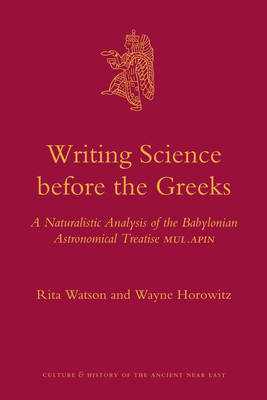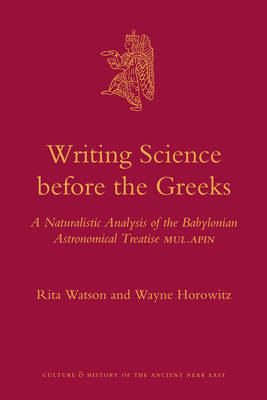
- Afhalen na 1 uur in een winkel met voorraad
- Gratis thuislevering in België vanaf € 30
- Ruim aanbod met 7 miljoen producten
- Afhalen na 1 uur in een winkel met voorraad
- Gratis thuislevering in België vanaf € 30
- Ruim aanbod met 7 miljoen producten
Zoeken
Writing Science Before the Greeks
A Naturalistic Analysis of the Babylonian Astronomical Treatise Mul.Apin
Rita Watson, Wayne Horowitz
€ 224,45
+ 448 punten
Omschrijving
The beginnings of written science have long been associated with classical Greece. Yet in ancient Mesopotamia, highly-sophisticated scientific works in cuneiform script were in active use while Greek civilization flourished in the West. The subject of this volume is the astronomical series MUL.APIN, which can be dated to the seventh century BCE and which represents the crowning achievement of traditional Mesopotamian observational astronomy. Writing Science before the Greeks explores this early text from the perspective of modern cognitive science in an effort to articulate the processes underlying its composition. The analysis suggests that writing itself, through the cumulative recording of observations, played a role in the evolution of scientific thought.
"All in all, the authors should be congratulated for this groundbreaking study. Apart from significant new insights into MUL.APIN it has opened up a new avenue for research on ancient scientific texts that is likely to yield further interesting results, particularly if the cognitive analysis is combined with other approaches."
Mathieu Ossendrijver, Humboldt University
"All in all, the authors should be congratulated for this groundbreaking study. Apart from significant new insights into MUL.APIN it has opened up a new avenue for research on ancient scientific texts that is likely to yield further interesting results, particularly if the cognitive analysis is combined with other approaches."
Mathieu Ossendrijver, Humboldt University
Specificaties
Betrokkenen
- Auteur(s):
- Uitgeverij:
Inhoud
- Aantal bladzijden:
- 252
- Taal:
- Engels
- Reeks:
- Reeksnummer:
- nr. 48
Eigenschappen
- Productcode (EAN):
- 9789004202306
- Verschijningsdatum:
- 21/03/2011
- Uitvoering:
- Hardcover
- Formaat:
- Genaaid
- Afmetingen:
- 165 mm x 246 mm
- Gewicht:
- 589 g

Alleen bij Standaard Boekhandel
+ 448 punten op je klantenkaart van Standaard Boekhandel
Beoordelingen
We publiceren alleen reviews die voldoen aan de voorwaarden voor reviews. Bekijk onze voorwaarden voor reviews.








